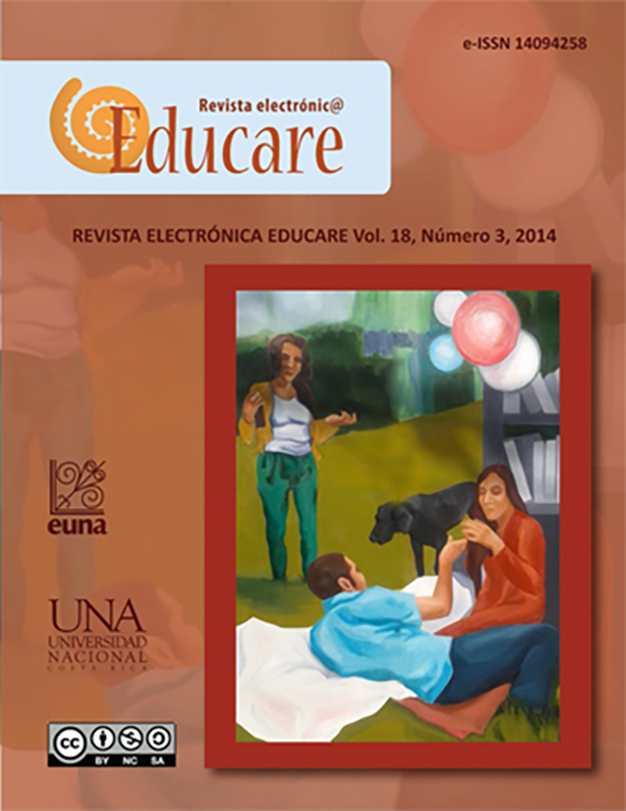Current Status of the Indigenous Languages Education Program from the Ministry of Public Education
DOI:
https://doi.org/10.15359/ree.18-3.12Keywords:
Minority language, Educational programs, Indigenous languages, Competence, Costa Rica.Abstract
All of the Costa Rican indigenous languages are in danger of being lost because their spheres of use continue to shrink over time and the intergenerational transmission is diminishing. For this reason, the Costa Rican government has initiated a program to teach indigenous languages as a way to prevent their disappearance. As an effort to obtain a panoramic overview of the current status of indigenous languages education, this article presents a bibliographical review of what has been said about this program, its origins, obstacles and educational achievements. It is concluded that indigenous languages education has not been approached from a second language teaching perspective, there is shortage of educational material and a need for more training and follow-up for teachers, and finally, the non-indigenous population needs to be involved to create a better environment for language revitalization. Aside from providing a formal educational space, little has been done to incorporate indigenous languages in the social life of communities. These languages continue to be anchored in the past and language teachers have been left with a responsibility that should have been shared with the families.
References
Borge, C. (2012). Cuarto informe del estado de la educación. Informe final). Costa Rica: Estado de la educación en territorios indígenas. San José, Costa Rica: Estado de la Nación en Desarrollo Humano Sostenible. Recuperado de http://www.estadonacion.or.cr/files/biblioteca_virtual/educacion/004/borge_educacion_indigena.pdf
Constenla, A. (1988). El guatuso de Palenque Margarita: Su proceso de declinación. Estudios de lingüística chibcha, 7, 7-37.
Constenla, A. (2011). La diversidad lingüística de Costa Rica: Las lenguas indígenas. Revista de Filología y Lingüística, 37(2), 93-106. Recuperado de http://revistas.ucr.ac.cr/index.php/filyling/article/view/6424/6129
Crystal, D. (2001). La muerte de las lenguas. Madrid: Cambridge University Press.
Espinoza, E., Mejía, N. y Ovares, S. (octubre, 2011). El malecu: Una cultura en peligro de extinción. Revista Electrónica Educare, 15 (Extraordinario), 69-84. Recuperado de http://www.revistas.una.ac.cr/index.php/EDUCARE/article/view/1685
García, G. y Zúñiga, Z. (julio, setiembre, 1987). Acciones educativas para la revitalización lingüística. América Indígena, 47(3), 489-517.
Ministerio de Educación Pública. (09 de marzo de 2011). Decreto N° 36451-MEP, artículo 71. La Gaceta N° 48. Recuperado de http://www.gaceta.go.cr/gaceta/?date=09/03/2011#_Toc287347865
Ovares, S. y Rojas, C. (2008). La enseñanza de las lenguas indígenas en Costa Rica. Letras 43(1), 11-21. Recuperado de http://www.revistas.una.ac.cr/index.php/letras/article/view/280
Quesada, M. Á. (1999-2000). Situación actual y futuro de las lenguas indígenas de Costa Rica. Estudios de Lingüística Chibcha, 18-19, 7-34.
Rojas, C. (1997-1998). Revitalización lingüística de las lenguas indígenas de Costa Rica. Estudios de lingüística chibcha, 16-17, 9-17.
Rojas, C. (2002). La enseñanza de las lenguas indígenas en Costa Rica. Revista Electrónica Educare, 3, 177-186. Recuperado de http://www.revistas.una.ac.cr/index.php/EDUCARE/article/view/997
Rojas, C. (Ene-Jun. de 2006). Actitudes hacia la enseñanza de las lenguas indígenas. Revista Letras, 1(39), 267-271. Recuperado de http://www.revistas.una.ac.cr/index.php/letras/article/view/950/874
Sánchez, C. (2009). Situación sociolingüística de las lenguas minoritarias de Costa Rica y censos nacionales de población 1927-2000: Vitalidad, desplazamiento y autofiliación etnolingüística. Revista de filología y lingüística, 35(2), 233-273. Recuperado de http://revistas.ucr.ac.cr/index.php/filyling/article/view/1174/1237
Sánchez, C. (2011). El desplazamiento de la lengua guatusa en contacto con el español: Identidad étnica, ideologías lingüísticas y perspectivas de conservación (Tesis doctoral). Universidad Autónoma de Madrid. Madrid: España. Recuperado de http://www.academia.edu/982724/El_desplazamiento_de_la_lengua_malecu_guatusa._Identidad_etnica_e_ideologias_linguisticas
Sánchez, C. (2013). Lenguas en peligro en Costa Rica: Vitalidad, documentación y descripción. Káñina, 37(1), 219-250. Recuperado de http://revistas.ucr.ac.cr/index.php/kanina/article/view/10589/9980
Tsunoda, T. (2006). Language Endangerment and Language Revitalization: An Introduction [Lenguas en peligro y revitalización de lenguas. Una introducción]. Berlin: Mouton de Gruyter. doi: http://dx.doi.org/10.1515/9783110896589
Vásquez, A. C. (2008). Caracterización de la situación idiomática de los pueblos indígenas de Costa Rica y su influencia en su educación. Revista Electrónica Educare, 12, Extraordinario, 61-66. Recuperado de http://www.revistas.una.ac.cr/index.php/EDUCARE/article/view/1455
Downloads
Published
How to Cite
Issue
Section
License
1. In case the submitted paper is accepted for publication, the author(s) FREELY, COSTLESS, EXCLUSIVELY AND FOR AN INDEFINITE TERM transfer copyrights and patrimonial rights to Universidad Nacional (UNA, Costa Rica). For more details check the Originality Statement and Copyright Transfer Agreement
2. REUTILIZATION RIGHTS: UNA authorizes authors to use, for any purpose (among them selfarchiving or autoarchiving) and to publish in the Internet in any electronic site, the paper´'s final version, both approved and published (post print), as long as it is done with a non commercial purpose, does not generate derivates without previous consentment and recognizes both publisher's name and authorship.
3. The submission and possible publication of the paper in the Educare Electronic Journal is ruled by the Journal’s editorial policies, the institutional rules of Universidad Nacional and the laws of the Republic of Costa Rica. Additionally, any possible difference of opinion or future dispute shall be settled in accordance with the mechanisms of Alternative Dispute Resolution and the Costa Rican Jurisdiction.
4. In all cases, it is understood that the opinions issued are those of the authors and do not necessarily reflect the position and opinion of Educare, CIDE or Universidad Nacional, Costa Rica. It is also understood that, in the exercise of academic freedom, the authors have carried out a rogorous scientific-academic process of research, reflection and argumentation thar lays within the thematic scope of interest of the Journal.
5. The papers published by Educare Electronic Journal use a Creative Commons License:














 The articles published by Educare Electronic Journal can be shared with a Creative Commons License:
The articles published by Educare Electronic Journal can be shared with a Creative Commons License: 



